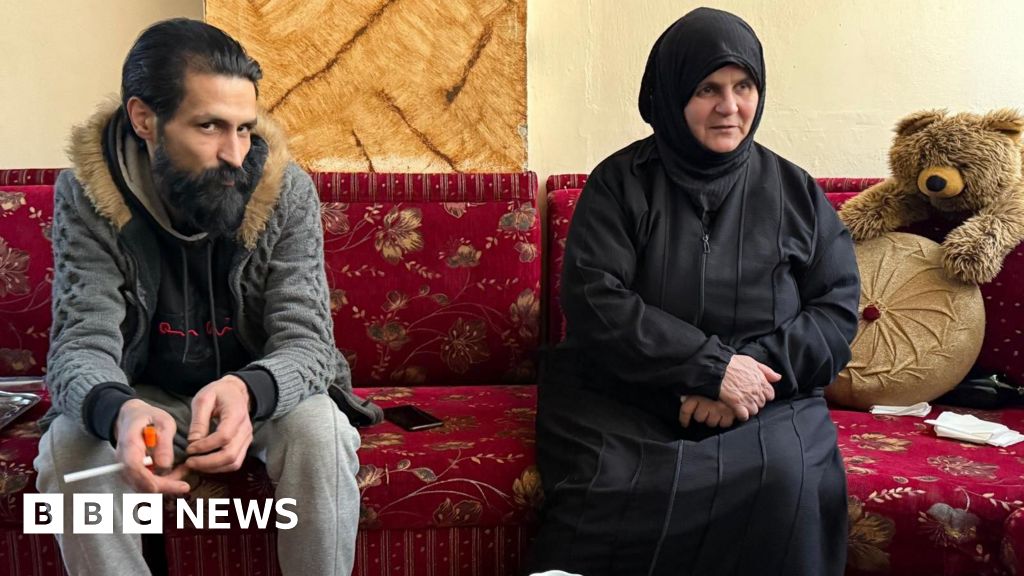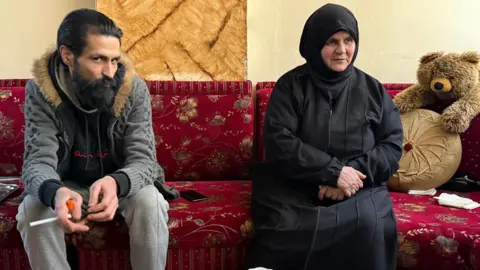 BBC
BBCThe new Syrian authorities promise justice for crimes under the Assad regime. But it’s a tall order, with many having suffered losses of every kind in the civil war. Sebastian Usher met people in Damascus for whom justice is key to how they see Syria’s future.
On the edge of Douma, one of the Damascus suburbs most devastated by the war, in a shrouded living room next to a stove, Umm Mazen recounts the 12 years she desperately sought news of two of her sons, who were arrested in the first years of the uprising and civil war, and swallowed up in the Assad-era security system.
For her oldest son, Mazen, she finally received a death certificate, but for Abu Hadi, no trace of him has ever been divulged.
Her third son, Ahmed, spent three years in the security system, including eight months in the red block for political prisoners in that byword for brutality, Saydnaya prison.
His front teeth stoved in by a torturer’s hammer, he remembers one moment when he believes he heard his brother Mazen’s voice answering a roll call in the same jail, but nothing more.
What justice does Umm Mazen seek for the destruction of her family?
“There should be divine justice, coming from God,” she says.
“I saw some local men bringing a shabiha (an armed regime supporter) to be killed.
“I told them: ‘Don’t kill him. Rather, torture him exactly the same way he tortured our young men’.”
“My two children died – or probably have died, but there are thousands of other young men who were subjected to torture.
“I pray to God that Bashar [al-Assad] stays in a dungeon underground and that Russia, which used to protect him, can’t help him.
“I pray to God to put him somewhere underground and that he is left in oblivion – just as he left our young men in his jails.”
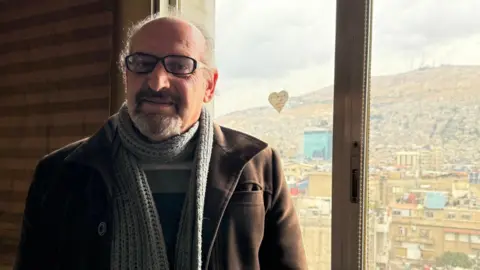
Lawyer Hussein Issa sought justice for dozens of people accused of political crimes under the Assads.
He faced constant pressure from the authorities over his advocacy, but persisted and managed to save some of his clients from being crushed under the wheels of the security system.
But for those assigned to the special terrorism courts, there was usually nothing that could be done.
The terrorism law loomed ever more darkly over Syria as the civil war continued.
Now, with the mountain on the edge of Damascus glimpsed through the window of his scruffy, smoke-filled office, the 54-year-old lawyer says he believes that many of the judges who were complicit with the Assad regime should be kicked out and legal action taken against them.
But others from that era, he says, could still play a role in the new judiciary.
As for the huge challenge of trying to deliver retrospective justice for the horrors of the past 50 years, Mr Issa says that establishing a judicial system capable of this is the most important task for Syria’s new authorities.
“If this system is not good, the future of the new state will be grim.
“We don’t know how bad it could then get. We are already afraid that some parties could cause strife and conflict.
“If we have a strong system and state, then we won’t be afraid of these things.
“If we don’t have them, we will be fearful. However, since I’m optimistic by nature, I think the new regime will definitely be better.”
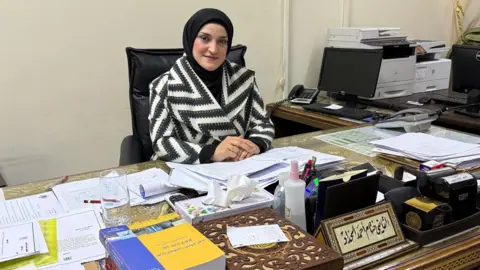
The monumental building in the Syrian capital where the justice ministry is located has been in suspension for several weeks after the fall of Assad.
Now, clusters of lawyers have gathered in the lifts and corridors ahead of the reopening of the civil and criminal courts.
In her fifth-floor office, the Deputy to the Minister of Justice, Khitam Haddad, says that criminal and civil cases will once again be dealt with, but the task of dealing with the crimes committed under the previous regime will not be tackled for now.
With her big, heavy desk covered in official papers, she says she’s been working as a judge since 2013.
She was appointed deputy justice minister in 2023. For now, she remains in place.
“I felt a personal responsibility about the matter,” she says.
“It is necessary for the work to continue, for the judges to go back to their work and for the courts to return, because as a Syrian I want my job to continue and I want this victory to continue, so that people have nothing to be afraid of.
“I want to send real and realistic messages of reassurance, not just talk.”
But some lawyers are already concerned over a move by the transitional authorities to establish a council to oversee the Bar Association without putting it to a vote.
In a petition, they said such an approach would replace one form of authoritarianism with another.
For now, the laws and judicial structure of the Assad era remain in place, including the terrorism law.
It could be a long time before the cases of any of those accused of crimes under the ousted regime are brought to trial.
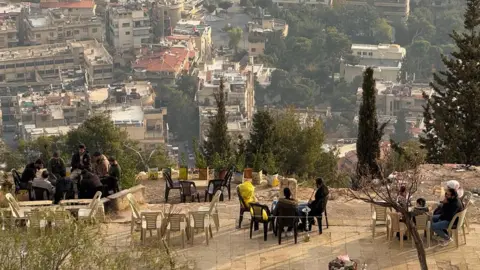
The new authorities have told Syrians not to take matters into their own hands, as videos have circulated of brutal summary justice being meted out to some former officials.
There have been raids and arrests – and some of those who escaped across the border to Lebanon or Iraq have been returned.
But there remains a big question over whether the justice system – which was for so long an instrument of repression – is capable of being reconfigured to take on this immense moral and logistical challenge.
High up on the mountain above Damascus, Syrians, young and old, are for now still breathing free – intoxicated by the cold clear winter air – in a place they were banned from entering by the security forces for more than a decade.
At cafes and kiosks that have sprung up in the weeks since the overthrow of Assad, they stare down at the city spread out before them – with both its dark memories and the promise of a different future, in which justice and accountability might just be allowed to play a part.

